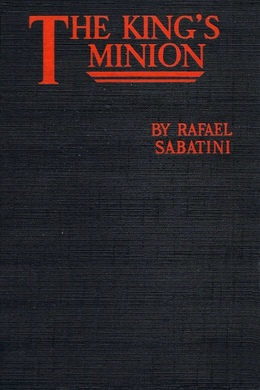
The King's Minion
Being The Rise and Fall Of Robert Carr of Ferniehurst
by Rafael Sabatini
subjects: Action & Adventure
-
EPUB 418 KB
-
Kindle 521 KB
-
Support epubBooks by making a small $2.99 PayPal donation purchase.
This work is available for countries where copyright is Life+70 or less.
Description
King James I, narrowly escaping assassination in the infamous Gunpowder Plot, has reason to suspect all around him. But surely he can trust members of his Privvy Council - and especially Robert Carr of Ferniehurst, Earl of Somerset and Knight of the Most Noble Order of the Garter? The Minion traces Carr’s meteoric rise and fall at the hands of the wary king whilst capturing all the thrill and vitality of seventeenth century England.
477 pages with a reading time of ~7.25 hours (119402 words), and first published in 1930. This DRM-Free edition published by epubBooks, 2016.
Community Reviews
There are currently no other reviews for this book.
Excerpt
King James, fully recovered from the terrible fright occasioned him by the Gunpowder Plot, had returned to his norm of pusillanimity. Guy Fawkes, unbroken in spirit, however broken in body by torture, had expiated on the gallows in Paul’s Yard the attempt–in his own bold words–to blow the Scots beggars back to their mountains. The beggars remained and profited by the distribution amongst them of the acres and possessions of the conspirators, most of whom were gentlemen of substance. For the King, too, the matter had not been without ultimate profit, of a more spiritual kind. It had enabled him by an exercise of the arts of kingcraft–a term signifying little more than the shameless use of falsehood and dissimulation–to parade before the world the divine inspiration vouchsafed to monarchs. It was, he pretended, the acuteness with which kings are supernaturally endowed which had enabled him to enucleate from obscurest utterances the true aim and nature of the plot, and thus, almost miraculously, to avert a national catastrophe. Some material profit, too, was to be extracted from it, in the course of a further display of the spiritual graces and accomplishments of this astounding prince. He was enabled to argue, cogently enough, that people themselves so intolerant as the Papists, on whose behalf it had been sought to blow him and his Parliament into a better world, deserved no toleration; that the Scarlet Woman on her seven hills propounded, indeed, the mystery of iniquity. Hence he was justified in proceeding against Papists and at the same time against Puritans–so as to be perfectly consistent in his exclusive upholding of the Established Church–by means of heavy fines and confiscations. Thus he replenished his sadly depleted treasury and was enabled further to relieve the necessities of those Scots beggars–and some English ones, too–who clustered about him. It did not trouble his elastic royal conscience that the plot of a few desperate men, for which he now punished an entire community, was directly sprung from his own bad faith in an earlier exercise of his art of kingcraft. Readily enough had he promised toleration alike to the co-religionaries of his mother and to the Puritans, when they had approached him on the subject in Scotland in the days of his own anxieties touching his succession to the throne of England. They were foolish to have trusted him. They should have perceived that a man who would not raise a finger to save his own mother from the block, lest by doing so he should jeopardise his inheritance of the English crown, would never scruple about a false promise or two that would help to ensure the unanimity of all classes of Englishmen in his favour. By breaking faith when he discovered that the Episcopalian religion, which made him head of the Church as well as of the State, was the only religion fit for kings, he provoked not only the Gunpowder Plot, but that earlier conspiracy in which Catholics and Puritans were united, the strangest bedfellows adversity ever made. All this, however, was now happily overpast. The heel of authority was firmly planted on the neck of Papist and Puritan, and their recusancy was being sweated out of them in the gold that was so urgently required to maintain the prodigal splendours of the court of this new kingdom of Great Britain. For now, in the year 1607 of the coming of Our Lord and fourth of the coming of King James, his majesty was in dire straits for ready money. Never before in the history of the country had there been, and never since has there been, such reckless extravagance as that which distinguished the descent of the Scots from their Northern fastnesses in the train of a king who was a veritable beggar on horseback.
